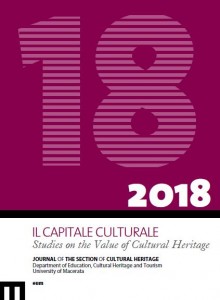|
Digital meets Culture https://www.digitalmeetsculture.net/article/not-a-mere-tangential-outbreak-gender-feminism-and-cultural-heritage/ Export date: Thu Apr 3 7:48:32 2025 / +0000 GMT |
«Not a mere tangential outbreak»: gender, feminism and cultural heritage The journal CAPITALE CULTURALE Studies on the Value of Cultural Heritage of the Department of Education, Cultural Heritage and Tourism of the University of Macerata, has published the article «Not a mere tangential outbreak»: gender, feminism and cultural heritage by Silvana Colella, Professor of English at the University of Macerata (Italy) and Senior Research Fellow at Coventry University. Research for this article was carried out under the auspices of Reach project. This essay focuses mainly on the ongoing academic debate about gender in heritage studies and offers an overview of the critical literature on gender and cultural Heritage focusing in particular on suggestions and recommendations about how to expand and further advance the gender agenda in the heritage field of research. The article highlights the richness of a debate which, although it occupies a marginal position in the wider fields of heritage and museology, is in no way irrelevant to the challenges faced by heritage institutions. The work is organized in 2 section:
The final part offers a synthesis of gender-aware proposals and methodological models elaborated, and in some cases tested, in the literature under review. Download the essay here.
|
